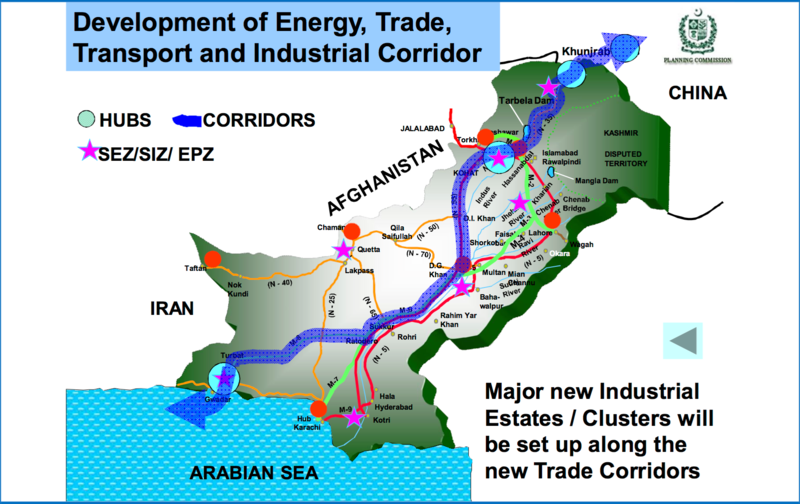
by Zafar Yousafzai 28 September 2023
The China-Pakistan Economic Corridor (CPEC) is a monumental infrastructure and economic development project that has garnered international attention since its inception. As a flagship initiative of China’s ambitious Belt and Road Initiative (BRI), CPEC aims to connect China’s western region to Pakistan’s Gwadar Port on the Arabian Sea through a network of highways, railways, pipelines, and energy projects. However, one critical factor that could significantly impact the success of CPEC is the stability of neighboring Afghanistan.
Before delving into the role of Afghanistan in CPEC, it’s essential to grasp the significance of this mega-project. CPEC is a multi-billion-dollar venture that encompasses a wide range of infrastructure development, including highways, railways, energy projects, and the expansion of Gwadar Port. These investments are expected to provide China with a shorter and more efficient trade route to the Middle East and beyond. For Pakistan, CPEC promises economic growth, job creation, and energy security.
Afghanistan shares a border with both China and Pakistan, making it a strategically important neighbor in the context of CPEC. While Afghanistan has faced decades of instability and conflict, its potential role in CPEC cannot be overlooked. One significant aspect is the geographical proximity of Afghanistan to CPEC. Afghanistan’s proximity to China’s Xinjiang region, where CPEC originates, means it could serve as a critical transit route for goods moving between China and Pakistan. This transit route could substantially reduce transportation costs and time for CPEC-related trade.
Furthermore, Afghanistan could serve as a gateway to Central Asia for trade and energy routes. The completion of CPEC has the potential to create a web of interconnected trade corridors across the region. Afghanistan’s stability would be vital for ensuring the smooth flow of goods and energy resources, benefiting all the countries involved. The stability of Afghanistan is crucial for the success of CPEC in several ways. First and foremost, instability in Afghanistan poses significant risks and challenges. The presence of extremist groups, ongoing conflicts, and security threats could potentially disrupt CPEC operations and investments. Security concerns have been a significant hindrance to the development of CPEC, as they affect not only the safety of workers and infrastructure but also the confidence of investors.
Conversely, a stable Afghanistan could offer numerous economic benefits for CPEC. A peaceful Afghanistan would provide a secure and efficient transit route for goods traveling between China and Pakistan. This would not only reduce transportation costs but also attract more international trade to the region. Furthermore, a stable Afghanistan could encourage foreign investors to participate in CPEC projects, leading to increased economic growth and job opportunities.
Afghanistan stands to benefit from CPEC in various ways. As a transit country, Afghanistan could collect transit fees, creating a source of revenue for the government. Moreover, CPEC projects could open up investment opportunities and job creation for Afghan citizens. The infrastructure development associated with CPEC, such as roads and railways, could significantly improve connectivity within Afghanistan, facilitating economic growth and trade. Additionally, Afghanistan’s involvement in CPEC could foster regional cooperation and connectivity. The project has the potential to enhance trade relations not only between Afghanistan, Pakistan, and China but also with Central Asian countries. This interconnectedness could boost economic development throughout the region.
Achieving stability in Afghanistan is a complex endeavor that requires the cooperation of regional players, including China, Pakistan, and Afghanistan itself. Security remains a primary concern, as insurgent activities and terrorist threats continue to plague the country. Regional powers must work together to address these challenges effectively. Strategies for enhancing security and stability in Afghanistan include supporting political reconciliation efforts and peace-building initiatives. This entails engaging with various Afghan stakeholders to find a negotiated settlement to the ongoing conflicts. International cooperation is also crucial in providing financial and logistical support for peace-building activities.
Building trust and cooperation among neighboring countries is paramount for ensuring the success of CPEC. Regional stability and economic development are interconnected, and each country has a vested interest in a peaceful and prosperous Afghanistan. Diplomatic efforts should focus on fostering collaboration, addressing shared security concerns, and promoting economic integration.
Several challenges must be addressed to harness Afghanistan’s potential within the framework of CPEC. First and foremost, addressing security threats and insurgent activities is imperative. A stable Afghanistan is not only in the interest of regional players but also of the international community. Efforts should be made to curb extremist elements and create a conducive environment for economic development.
Political reconciliation and peace-building efforts within Afghanistan require sustained commitment and international support. These processes are inherently complex, and progress may be slow. However, they are essential for achieving lasting stability in the country. International cooperation and support are vital components of efforts to stabilize Afghanistan and make the most of its potential within CPEC. The international community must contribute resources, expertise, and diplomatic support to facilitate peace and development in the region.
The stability of Afghanistan is intricately linked to the success of the China-Pakistan Economic Corridor. A peaceful Afghanistan can serve as a vital transit route, reducing transportation costs and encouraging international trade. Moreover, Afghan participation in CPEC projects holds the promise of economic growth and job creation. However, achieving stability in Afghanistan requires concerted efforts by regional and international actors, focusing on security, political reconciliation, and economic development. The collective pursuit of peace and prosperity in Afghanistan can unlock the full potential of CPEC and bring enduring benefits to the region.
